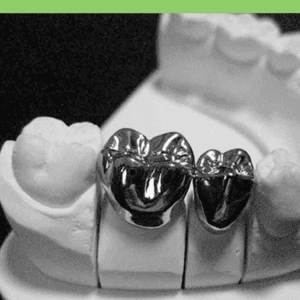 The term “crown” describes the portion of your tooth from the gum line up (or down) – in other words, the portion of the tooth that can be seen in a healthy mouth. It is also used more colloquially to describe the dental procedure of having a prosthetic “crown” (also called a “cap”) placed over a decayed, chipped, cracked, or otherwise damaged tooth.
The term “crown” describes the portion of your tooth from the gum line up (or down) – in other words, the portion of the tooth that can be seen in a healthy mouth. It is also used more colloquially to describe the dental procedure of having a prosthetic “crown” (also called a “cap”) placed over a decayed, chipped, cracked, or otherwise damaged tooth.
When the prosthetic crown is constructed predominately of base metal, it is designated as such because less than 25% of its composition is of the “noble” metals: gold, platinum, palladium, and silver, and its predominant makeup is of chromium and nickel. Patients with allergies to metals may not tolerate these as well as Gold, which has a composition that is over 60% noble metal, of which more than 40% must be gold. Gold is more bio-compatible than base metals, and is resistant to corrosion and oxidation better than other metals.
The higher the percentage of noble metals, the less likely a crown is to corrode or oxidize. A full, base metal crown is primarily used when the strength of metal is needed, and when repair is needed outside the “smile zone,” as with back molars where the chewing force is greater.
